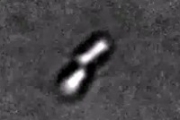Viewings: 7535

Russian microbiologists and their American colleagues have recently installed, which may be a hypothetical Martians. This does not green men, and microbes similar to terrestrial bacteria-extreme-lovers of a kind Carnobacterium. These microorganisms grow and multiply in conditions close to the Martian. And found them in the Siberian permafrost.
For anybody not a secret, that to live on Mars is difficult to so there is severe conditions. Red planet has a rather tenuous atmosphere (the pressure is 160 times smaller than the earth), most of which is carbon dioxide (95,32 percent). Such an atmosphere is not able to keep the sun's heat generated by the planet. In addition, on Mars there is no water in liquid form, so there is no heat reservoirs and distributors, what are the earth's seas and oceans.
The result is that the average temperature at the surface of the planet is about -50 C. Well, and its spread very great: from -153 degrees at the pole in winter and +20 C on the planet's equator at noon. That is, the main problem for a hypothetical Martian life (provided that, if it would be similar to earth would be cold, because of which the organisms would have to spend several times more energy on its own heating than their terrestrial counterparts.
And, of course, one cannot rule out the devastating effects of cosmic radiation, which sparse and poor oxygen atmosphere will not be able to protect. Recently a group of American microbiologists found that the radiation level on the surface of the red planet is so high that at a depth of less than ten centimeters long term existence of the organisms, "done" carbon polymers, is not possible. Here, however, we should mention such organisms that are found in today's Earth. For actually living cells are well able to protect themselves from harmful radiations, if they need it.
For example, they can create or organic pigments "antidotes"neutralize harmful influence. By the way, according to the most common version, a long time ago on Earth photosynthesis has emerged as a way of coping with UV radiation and then some bacteria "guessed" to use it for the production of organic matter. So with the problem of radiation Martian microorganisms, most likely, would quickly sorted out. But to adapt to the low temperatures of the red planet would be much more difficult.
However, in this case, "it's hard" also does not mean "is impossible in principle". That recently and it has been proven in interesting research conducted by Russian microbiologists from the Institute of physicochemical and biological problems of soil science, as well as their American colleagues. The researchers suggested that once water on Mars exists only in the form of ice, then you need to look for bacteria that can withstand tough conditions of the red planet in sandy sediments that are deposited in the horizon of permafrost and structure reminiscent of the Martian regolith.
Strictly speaking, such deposits lot on the territory of our country - they are on the banks of the Siberian rivers in the permafrost zone. And now scientists to start took bacterial microflora from a depth of about 20 metres on the right Bank of the river Kolyma. After microbiologists washed the samples of sand and then sowed swabs containing various micro-organisms in nutrient-rich environment. Initially the colony of bacteria were grown at 28 degrees Celsius in a normal atmosphere, to get a large number of individuals.
Once this was achieved, the researchers proceeded to the second stage of the experiment, cultivation of bacteria in the conditions approached to conditions of the red planet. Although, of course, fully all of them do not reproduce: microorganisms cultivated in conditions of zero temperature, low oxygen and total pressure in seven millibar (about 150 times below the ground). So, as you can see, all the same, and the pressure and temperature were higher than on Mars. But still not all single-celled "Siberians" could withstand such a mockery of themselves - within 30 days from the ten thousands of the isolated strains normally grow and multiply only representatives of six species.
Interestingly, all of these potential "Martians" belong to the genus Carnobacterium. These beings are common inhabitants of soils in the permafrost conditions in warmer edges data cornebacterium not meet. They do not need oxygen, and live by that decompose under anaerobic conditions of dead organic matter. By the way, during the experiment it was found that one of the strains of these single-celled "extremes" more pleasing it is cold, low pressure and almost complete absence of oxygen. In normal conditions the colonies grew bad, but in the "Martian" - just rampant.
Previously bacteria from this group were found in the lakes of Antarctica. About them it was known that these organisms are capable of a long time to dwell in isolation covered with ice. By the way, and their Siberian relatives not "what ' when are cut off from the world. According to scientists, representatives extracted from the permafrost of the Kolyma river, there were about six or eight thousand years ago and since then have been cut off from the outside world. During this time they managed so well to adapt to the extreme conditions that these conditions are for bacteria norm.
Microbiologists say that the results obtained in the course of this experiment is very important to correctly understand and assess the possible existence of any life on Mars. Simply put, all now have an idea of what can be hypothetical Martian bacteria. If so, then in the memory automatically research vehicles that are studying the surface of the red planet, now you can put information about the structure and physiology Carnobacterium and be ordered to look for something similar. It is not excluded, that after that the search will be much more effective...
















